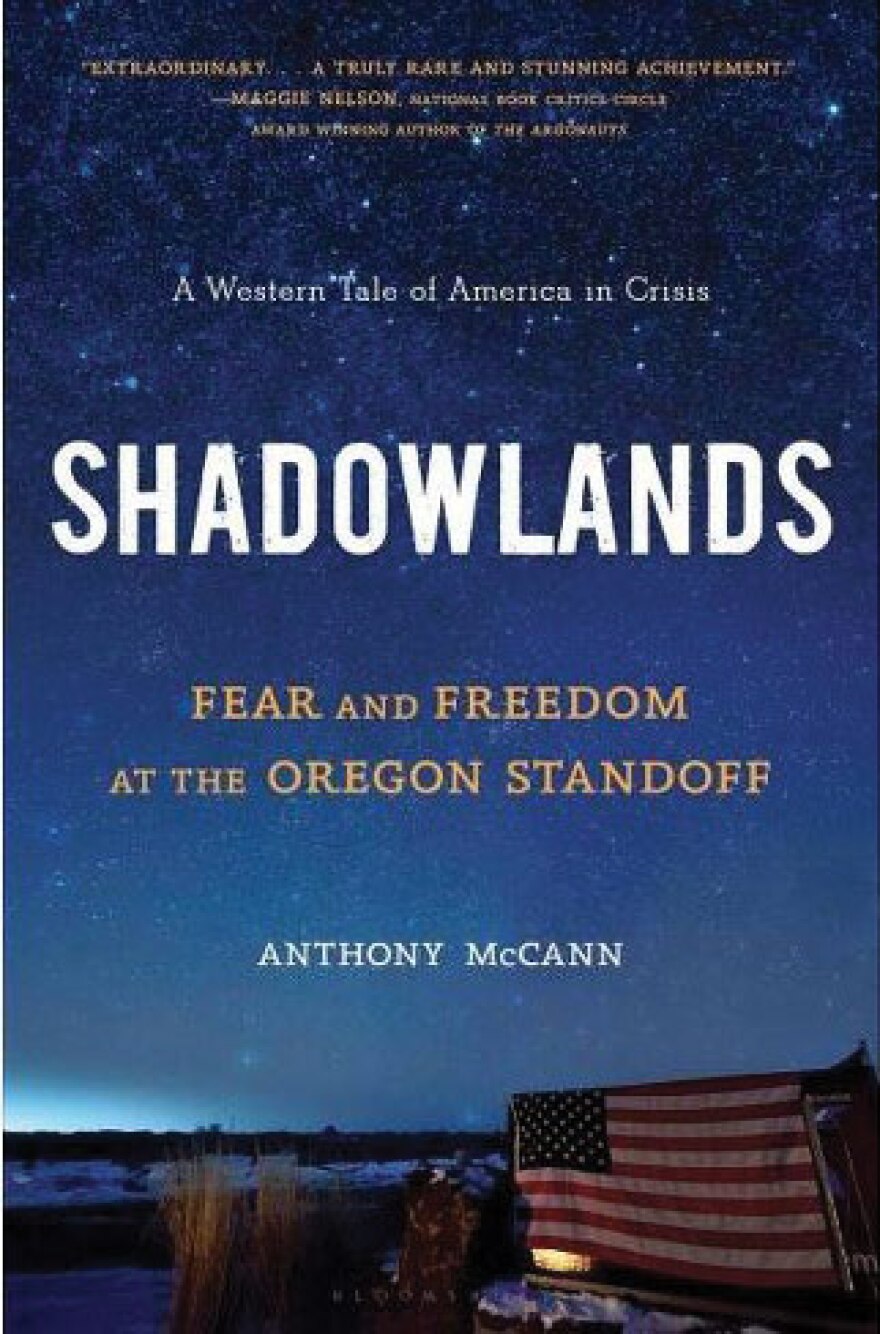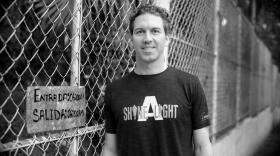Two new books diagnose the anger-driven causes and effects of Bundyism, making it clear that there’s no “we” in “patriot”
Whenever I hear the French word malheur, I recall my haphazard studies of that language, which somehow included The Stranger by Albert Camus. At the end of the novel’s first part, after the narrator Meursault unaccountably shoots a man on a beach, he observes: Et c’était comme quatre coups brefs que je frappais sur la porte du malheur.
I’ve seen it translated variously, but it comes down to: And it was like four knocks on the door of misfortune. One colorful translation made it the door of my undoing, which is more to the point, as Meursault will pay for his crime. It’s worth keeping in mind that Meursault was a colonial Frenchman who pointlessly kills a nameless Algerian in his own land.
And what, exactly, was the point of a ragtag band of “patriots” taking over the Malheur National Wildlife Refuge in early 2016? Not much, it turned out. One freedom lover walked right through that door of undoing to his death. A few of the two dozen or so well-armed occupiers received suspended sentences for participating in the seizure of the U.S. Fish and Wildlife Service facility for more than a month, and others were given prison sentences, but Ammon Bundy and his brother Ryan were acquitted of all federal charges. And maybe that proved a harbinger of misfortunes since settled upon us.
As Anthony McCann notes in Shadowlands, his hefty account of the Malheur seizure and its aftermath, the area got its inauspicious name when Hudson’s Bay Company explorer Peter Skene Ogden failed to find beaver, or anything much of value to his employers, during an expedition in the 1820s — Ogden scrawled the French epithet on his map. The basin of alkaline lakes and freshwater marshes is uninviting habitat for humans, but perfect for a lush variety of high-desert plant life and migrating birds. The latter became targets of hunters seeking to satisfy the Eastern taste for plumed millinery in the later 1800s. Persuaded by photographs of the wildlife and exercising powers granted by Congress, President Theodore Roosevelt proclaimed the area a federal refuge in 1908. The Supreme Court has more than once ruled the federal government’s control over the land, including rules for hunting and cattle grazing, is constitutional.
But decisions handed down by the Supreme Court avail little against the constitutional interpretations of God, at least as received by the likes of Ammon Bundy. If that name sounds familiar, it is because the Malheur seizure was Act Two of a melodrama that had unfolded roughly two years earlier in Clark County, when Bundy’s father, Cliven, successfully staved off an attempt by the U.S. Bureau of Land Management to round up and remove his cattle, which he had been grazing illegally on federal land. Act One of the Bundy Burlesque is neatly chronicled by John Temple in another new book, Up in Arms.
Like son, so the father. Cliven Bundy had been paying the proper fees to graze his herd on BLM land near Bunkerville, among the last of the breed of break-even ranchers raising cattle in Nevada’s most populous and growing county. When the Fish and Wildlife Service put the desert tortoise on its endangered species list due to rampant development in the Las Vegas Valley, Clark County agreed to set aside 400,000 acres elsewhere for tortoise habitat and started buying out hardscrabble ranchers. But not Cliven Bundy. He wasn’t budging.
Temple ties Cliven Bundy’s battles with Clark County and the feds to the burgeoning of the “patriot” movement of the 1990s, when paranoia about One World government, gun control, and federal ownership of Western land sprouted survivalist and militia groups. You’ll recall that partly as payback for federal agents’ disastrous handling of the armed standoffs at Ruby Ridge, Idaho, and Waco, Texas, Timothy McVeigh blew up the Murrah Federal Building in Oklahoma City in 1995.
So you have to sigh when you read this sentence in Up in Arms: “But the video of the feds tasing the cowboy detonated like a truck packed with ammonium nitrate.” Temple here refers to Ammon Bundy, Cliven’s son, being tased by BLM rangers when he and supporters tried to stop them from removing what they thought were dead Bundy cattle from the range. But Temple also alludes to a crucial advance for patriot forces from the days when all they had was smoldering ire on talk radio — YouTube and other channels of the web. Ammon, unlike his salty and indiscreet father, had a feel for optics in the internet age, making his own video calls for action. Cliven lost the news media when he started spouting racist nonsense, but Ammon insisted, two years later at Malheur, that news media be allowed to enter the headquarters and interview the occupiers.
And many of the same characters attracted by YouTube videos to Bunkerville in 2014 showed up again when Ammon put out the call for help at Malheur — including Robert LaVoy Finicum, whom federal agents shot dead as he reached for a gun. And like so many of the other Bundyites interviewed by McCann and Temple, Finicum comes across as a fount of aimless indignation. The part-time rancher, McCann notes, picked his own fight with the BLM “in spite of the fact that, as LaVoy himself said, he’d never actually had any problems with the agency.” Of another supporter McCann writes: “How he’d ended up hooked in with Ammon Bundy and the anti-federal land movement was something he could never quite explain.”
As Evelyn Waugh observes in Sword of Honour, “Anger carries its own propulsive mechanism and soars far from the point of ignition.”
Ammon Bundy himself had to find another target for his unguided wrath when the ranchers he’d gone to Oregon to support, Dwight and Steven Hammond, spurned his help. No problem, for when the Lord taketh away, He giveth again. The Bundys are Mormons, followers of a faith whose founder and subsequent leaders claim to have received direct revelations from God. When he could not sign on the Hammonds, who were out of fight and headed for federal prison on an arson conviction, the Lord told him what to do next — take over the Malheur refuge.
And why? It’s in the Constitution, the Bundys and their followers insist. Prone to carrying pocket copies of the pseudo-sacred text, they nonetheless misread the Constitution as dangerously as they interpret the Will of God. They insist that the Enclave Clause of Article 1, Section 8, proscribes federal ownership of land. Both McCann and Temple point out that this is just plain wrong. But Ammon exhorted his internet faithful: “Come to Harney County and see the wonderful thing the Lord is about to accomplish.”
In his lectures at the University of Edinburgh compiled as The Varieties of Religious Experience, philosopher and psychologist William James, while observing that usually the founders of religions and not the followers profess personal communion with God, also argues:
“The pivot round which the religious life, as we have traced it, revolves, is the interest of the individual in his private personal destiny. Religion, in short, is a monumental chapter in the history of human egotism.”
This is among James’s harshest judgments, for even as a scientist he finds room for a vague, universal deity. He points to the key problem of religion in public life, the threat of imposing personal witness on public policy, which the First Amendment should stifle. James’s comment also highlights the lonely rage animating the so-called patriots. Although they revere the Constitution’s first phrase, “We the people,” there’s little “we” involved in their ideals. They are members of a society that has to rally in private parking lots. Although both Temple and McCann try their best to understand these men (and a few women), they cannot help revealing a mind-set in which “freedom” means not the end of federal land control, or even of federal government, but the end of civil society.
Rigorous individualism, set in the figurative, mediated landscape of soulless commercial endeavor — also celebrated as “freedom” — is an empty, unloved life. And yet, what the patriots fail to appreciate when they cry “we the people” is what McCann calls the “ultimate systemic indifference to our individual lives.” The very system they would preserve eats them alive.
McCann pauses long enough to consider the Paiutes who originally lived in the Malheur basin, long before any white man marked a map with a damning name. Nomadic but communal, they worked the land together, sharing what the harsh but beautiful basin could yield. What a thought.
But freedom, you know?










